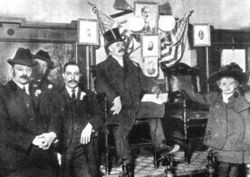
George Washington Plunkitt
Encyclopedia

U.S. state
A U.S. state is any one of the 50 federated states of the United States of America that share sovereignty with the federal government. Because of this shared sovereignty, an American is a citizen both of the federal entity and of his or her state of domicile. Four states use the official title of...
of New York
New York
New York is a state in the Northeastern region of the United States. It is the nation's third most populous state. New York is bordered by New Jersey and Pennsylvania to the south, and by Connecticut, Massachusetts and Vermont to the east...
, representing the Fifteenth Senate District, who was especially powerful in New York City
New York City
New York is the most populous city in the United States and the center of the New York Metropolitan Area, one of the most populous metropolitan areas in the world. New York exerts a significant impact upon global commerce, finance, media, art, fashion, research, technology, education, and...
. He was part of what is known as New York's Tammany Hall
Tammany Hall
Tammany Hall, also known as the Society of St. Tammany, the Sons of St. Tammany, or the Columbian Order, was a New York political organization founded in 1786 and incorporated on May 12, 1789 as the Tammany Society...
machine.
Tammany Hall
Plunkitt became wealthy by practicing what he called "honest graftPolitical corruption
Political corruption is the use of legislated powers by government officials for illegitimate private gain. Misuse of government power for other purposes, such as repression of political opponents and general police brutality, is not considered political corruption. Neither are illegal acts by...
" in politics. He was a cynically honest practitioner of what today is generally known as "machine politics," patronage-based and frank in its exercise of power for personal gain. In one of his speeches, quoted in Plunkitt of Tammany Hall, he describes the difference between dishonest and honest graft: for dishonest graft one worked solely for one's own interests, while for honest graft one pursued the interests of one's party, one's state, and one's personal interests all together.
He made most of his money through land purchases, which he knew would be needed for public projects. He would buy such parcels, then resell them at an inflated price. (This was "Honest Graft". "Dishonest Graft" according to Plunkitt, would be buying land and then using influence to have a project built on it.) He defends himself, saying, "I could get nothin' at a bargain but a big piece of swamp, but I took it fast enough and held on to it. What turned out was just what I counted on. They couldn't make the park complete without Plunkitt's swamp, and they had to pay a good price for it. Anything dishonest in that?" Plunkitt was also a big party man, believing in appointments, patronage, spoils, and all of the practices that were curtailed by the civil service
Civil service
The term civil service has two distinct meanings:* A branch of governmental service in which individuals are employed on the basis of professional merit as proven by competitive examinations....
law. He saw such practices as both the rewards and cause of patriotism. He hated the civil service system that he believed would be the downfall of the entire United States governmental system.
The positive side of machine politics, as Plunkitt saw it, was the closeness between political bosses and their constituencies. He cites how Tammany bosses such as himself would assist the poor of New York in immediate and necessary ways (such as by providing emergency loans) while others, such as social reformers and the federal government, would only push for long-term improvements in the situation of the urban poor. Similarly, he argues that the machine listened to and defended the poor while others regarded them from a distanced, patronizing point of view. Thus, Plunkitt regarded the fragmented and independent format of machine governance to be the most perfect form of urban administration possible.
Plunkitt is also remembered for the line he used to defend his actions: "I seen my opportunities and I took 'em."
In 1905 he underwent an operation. He died in 1924.

